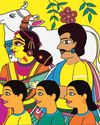
A nation's quest for national identity building, stability and social transformation depends on the development of science, technology and innovation (STI). The growth of China and India is dependent on technological transformation and technological leadership. As positive indicators of success, both countries are rising steadily in this field.
China is an upper middle-income country and India is a lower middle-income country. Being neighbours and starting their independent growth journeys simultaneously, they often prompt comparison between them. To forecast the future growth trajectory and global power trends involving these two countries, the science, technology and innovation (STI) indicators serve as a global framework for measurement, analysis, comparison, technological intelligence and strategic statistical data.
The chief components of these indicators include research and development endeavours and innovation systems.
India began its post-independence journey with the goals of modernisation and, having missed the industrial revolution, focused on planned public investments in higher education, science and technology, agriculture, energy and industry. As India faced a volatile strategic environment, S&T in defence and military became a necessity. The Indian space programme, nuclear programmes and Antarctic programme benefited from the support of the Soviet Union and sporadic contributions from the US and other western powers.
India has rolled out four strategic documents for STI since 1947-science policy resolution (1958), technology policy statement (1983), science and technology policy (2003) and science, technology and innovation policy (2013). The fifth one is soon to be launched as the national science, technology, and innovation policy and is under public consultation. These policies have underlined priorities, sectoral focus and strategies for STI development in India.
Diese Geschichte stammt aus der July 21, 2024-Ausgabe von THE WEEK India.
Starten Sie Ihre 7-tägige kostenlose Testversion von Magzter GOLD, um auf Tausende kuratierte Premium-Storys sowie über 8.000 Zeitschriften und Zeitungen zuzugreifen.
Bereits Abonnent ? Anmelden
Diese Geschichte stammt aus der July 21, 2024-Ausgabe von THE WEEK India.
Starten Sie Ihre 7-tägige kostenlose Testversion von Magzter GOLD, um auf Tausende kuratierte Premium-Storys sowie über 8.000 Zeitschriften und Zeitungen zuzugreifen.
Bereits Abonnent? Anmelden

The day of the knuckle-duster
Several narratives have emerged from the Donald Trump-Volodymyr Zelensky-J.D. Vance dust-up in the Oval office, the most disturbing being the opinion that “Zelensky invited it”.

The AGI dilemma
Spooky and powerful, AGI (Artificial General Intelligence), the planet’s newest technology, has divine benefits, as also diabolical applications that can trigger our destruction.

I want to transform MP into a powerhouse of development
GIS 2025 surpassed expectations in investment commitments, participation, and policy impact.

It is not NEP 2020, it is RSS 2020
TAMIL NADU’S RESISTANCE to the three-language policy under the National Education Policy (NEP) 2020 has reignited the debate over linguistic identity.

Munde blues
Just months into its tenure, the Fadnavis government suffers multiple blows

Plastic buckets and parliament seats
The plastics industry boomed in the 1970s when our rulers told our people to make fewer babies. The dairy industry, already on a high milkmark, should boom if Telugu Desam MP Kalisetti Appalanaidu gets people to make more babies. What’s the connection? Hold on. First listen to India’s population story that’s already a statistical farce, and may soon be a political tragedy.

MDGA-Make Diplomacy Great Again
Must say that all the reports of 'Agent Krasnov' make fascinating reading—like one of those old school, thick-as-a-brick bestsellers that Irving Wallace and Robert Ludlum used to write.

In search of Pampa
Salman Rushdie breathes life to the forgotten goddess Pampa Devi in his novel Victory City (2023).

Centre of attraction
If the enthusiasm at the Global Investors Summit is anything to go by, Madhya Pradesh is poised to write a new chapter of development

RO AND BEHOLD!
As the Champions Trophy win showed, the Rohit Sharma-led veteran brigade might not be over the hill. However, they will have to be on their toes as age and younger talent catch up